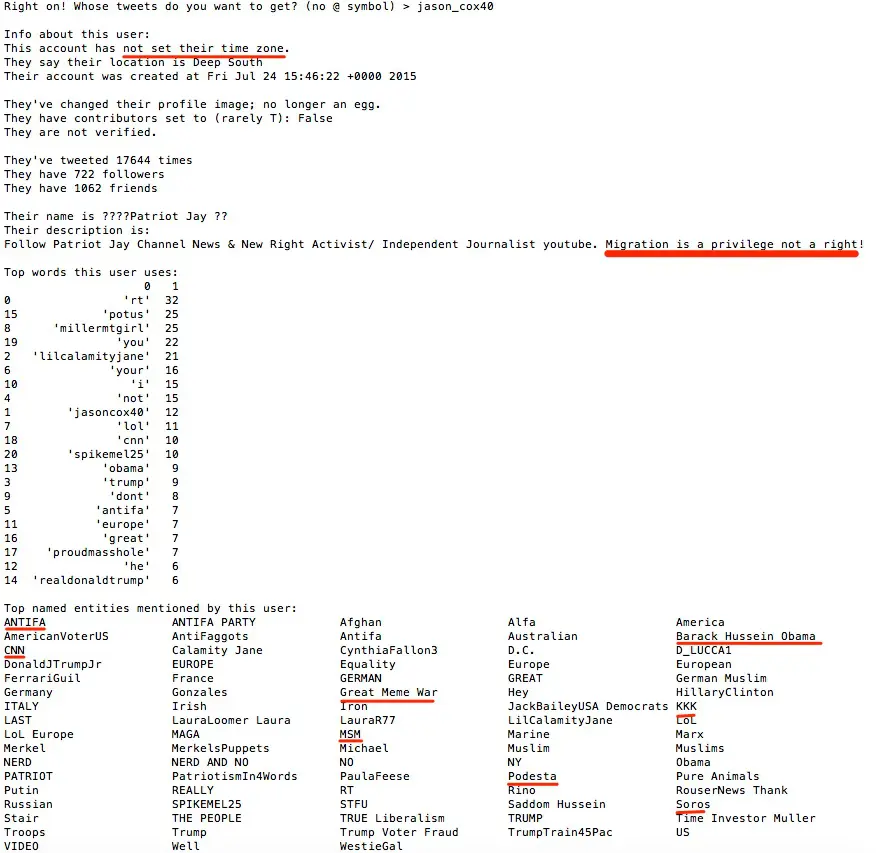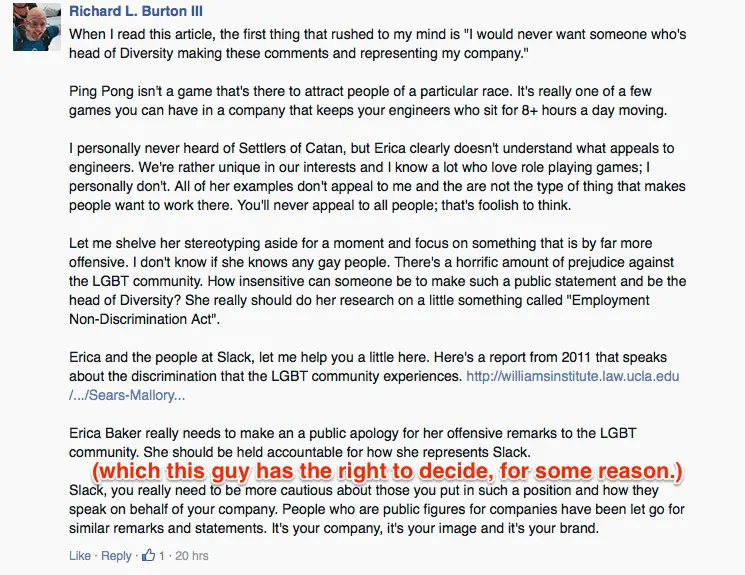Paper cut. Lemon juice.
When you hear Marco Rubio claim that regulation caused the global financial meltdown of 2007-2008, have a laugh… and/or a drink. Both is advisable, really.
White Collar Crime Through the Ages: A Timeline
Paper cut. Lemon juice.
When you hear Marco Rubio claim that regulation caused the global financial meltdown of 2007-2008, have a laugh… and/or a drink. Both is advisable, really.
White Collar Crime Through the Ages: A Timeline
While multiple formal investigations against the Trump family and administration continue to unfold, and Drumpf supporters weirdly deny the probable cause for concern, Putin’s troll army continues to operate out in the open on Twitter, Facebook, Medium, and other social media networks. The sheer scale of this operation started to become clear to me in the months leading up to Election 2016, having both spent a lot of time on social media both professionally and personally for over a decade as well as a hefty amount of time on political investigation during this presidential cycle: bots on Twitter had taken over.
Whatever your thoughts on the #RussiaGate corruption scandal may be, it should concern any citizen that an enormous group of bad actors is working together to infiltrate American social media, with a specific intent to sway politics. Media literacy is one part of the answer, but we’re going to need new tools to help us identify accounts that are only present in bad faith to political discourse: they are not who they claim to be, and their real goals are kept carefully opaque.
We should consider our nation embroiled in a large international game of psychological warfare, or PsyOps as it is referred to in intelligence circles. The goal is to sow disinformation as widely as possible, such that it becomes very difficult to discern what separates truth from propaganda. A secondary goal is to sow dissent among the citizenry, particularly to rile up the extremist factions within America’s two dominant political parties in an attempt to pull the political sphere apart from the center.
We didn’t really need much help in that department as it is, with deep partisan fault lines having been open as gaping wounds on the American political landscape for some decades now — so the dramatically escalated troll army operation has acted as an intense catalyst for further igniting the power kegs being stored up between conservatives and progressives in this country.
Luckily there are some ways to help defray the opposition’s ability to distract and spread disinfo by identifying the signatures given off by suspicious accounts. I’ve developed a few ways to evaluate whether a given account may be a participant in paid propaganda, or at least is likely to be misrepresenting who they say they are, and what their agenda is.
Sometimes it’s fun to get embroiled in a heated “tweetoff,” but I’ve noticed how easy it is to feel “triggered” by something someone says online and how the opposition is effectively “hacking” that tendency to drag well-meaning people into pointless back-and-forths designed not to defend a point of view, but simply to waste an activist’s time, demoralize them, and occupy the focus — a focus that could be better spent elsewhere on Real Politics with real citizens who in some way care about their country and their lives.
– Conspicuously hyper-patriotic bio (and often, name) – Posts predominantly anti-Democrat, anti-liberal/libtard, anti-Clinton, anti-Sanders, anti-antifa etc. memes:


– Conspicuously hyper-Christian in bio and/or name of bots on Twitter:


Seems to tweet &/or RT constantly without breaks — supporting evidence of use of a scheduler tool at minimum, and displaying obviously automated responses from some accounts. The above account, for example, started less than 2 years ago, has tweeted 15,000 more times than I have in over 10 years of frequent use (28K). Most normal people don’t schedule their tweets — but marketers and PR people do.


– Posts exclusively about politics and potentially one other primary “normie” topic, which is often a sport – May proclaim to be staunchly not “politically correct”:


– Bots on Twitter have a strange aversion to being added to Lists, or making Lists of their own:


– Uses hashtags more than normal, non-marketing people usually do:


– Seems ultimately too one-dimensional and predictable to reflect a real personality, and/or too vaguely similar to the formula:




– Most obviously of all, it retweets the same thing over and over again:




– Tweets predominantly about a predictable set of memes:




Mismatched location and time zone is another “tell” — and although you can’t get the second piece of data from the public profile, it is available from the Twitter API. If you know Python and/or feel adventurous, I’m sharing an earlier version of the above tool on Github (and need to get around to pushing the latest version…) — and if you know of any other “tells” please share by commenting or tweeting at me. Next bits I want to work on include:
Before we dive into the perils of issue policing, I have to say that it’s heartening to see so many new faces and hear many new voices who may in the past have not explicitly considered themselves “activists,” or who have felt a greater call to stand up against a political administration whose ideologies show every indication of running counter to a constitutional democratic framework.
If that describes you: THANK YOU! You are awesome. And if you’re an Old Hat at this sort of thing, this post is for you too — by way of initiating a civil dialogue with some of the fresh faces you see in your timeline or in your local community who may be exhibiting the following behavior:
Making claims that issue X, Y, or Z is “not important” or “not as important” as issue A, B, or C — which is what we should really be discussing right now.
Here’s why this behavior tends to do more harm than good:
But we will grow from it, and they will not — over the long run, at least.
Things we need to improve upon and/or rebuild:
Republicans do not like to elect women in Congress. Or anywhere else, for that matter.
Women need more representation across the board! Let’s do this, America.
P.S. If you have any need for a Slack bot that returns data on sitting Congresspeople, look no further! You can install this bot in Slack easily; you’ll just need to set up a Fieldbook account.
(As of 1/6/2015)
| Seniority | Member | Party & State | Start of Service |
| (in desc order) | Marcy Kaptur | (D), OH | 01-03-1983 |
| Louise Slaughter | (D), NY | 01-03-1987 | |
| Nancy Pelosi | (D), CA | 06-02-1987 | |
| Nita Lowey | (D), NY | 01-03-1989 | |
| Ileana Ros-Lehtinen | (R), FL | 08-29-1989 | |
| Rosa DeLauro | (D), CT | 01-03-1991 | |
| Eleanor Holmes-Norton (delegate) | (D), DC | 01-03-1991 | |
| Maxine Waters | (D), CA | 01-03-1991 | |
| Corrine Brown | (D), FL | 01-03-1993 | |
| Anna Eshoo | (D), CA | 01-03-1993 | |
| Eddie Bernice-Johnson | (D), TX | 01-03-1993 | |
| Carolyn Maloney | (D), NY | 01-03-1993 | |
| Lucille Roybal-Allard | (D), CA | 01-03-1993 | |
| Nydia Velazquez | (D), NY | 01-03-1993 | |
| Sheila Jackson Lee | (D), TX | 01-03-1995 | |
| Zoe Lofgren | (D), CA | 01-03-1995 | |
| Diana DeGette | (D), CO | 01-03-1997 | |
| Kay Granger | (R), TX | 01-03-1997 | |
| Loretta Sanchez | (D), CA | 01-03-1997 | |
| Lois Capps | (D), CA | 03-10-1998 | |
| Barbara Lee | (D), CA | 04-07-1998 | |
| Grace Napolitano | (D), CA | 01-03-1999 | |
| Jan Schakowsky | (D), IL | 01-03-1999 | |
| Susan Davis | (D), CA | 01-03-2001 | |
| Betty McCollum | (D), MN | 01-03-2001 | |
| Marsha Blackburn | (R), TN | 01-03-2003 | |
| Madeleine Bordallo (delegate) | (D), GU | 01-03-2003 | |
| Candice Miller | (R), MI | 01-03-2003 | |
| Linda Sanchez | (D), CA | 01-03-2003 | |
| Virginia Foxx | (R), NC | 01-03-2005 | |
| Cathy McMorris-Rodgers | (R), WA | 01-03-2005 | |
| Gwen Moore | (D), WI | 01-03-2005 | |
| Debbie Wasserman-Schultz | (D), FL | 01-03-2005 | |
| Doris Matsui | (D), CA | 03-08-2005 | |
| Kathy Castor | (D), FL | 01-04-2007 | |
| Yvette Clarke | (D), NY | 01-04-2007 | |
| Niki Tsongas | (D), MA | 10-18-2007 | |
| Jackie Speier | (D), CA | 04-10-2008 | |
| Donna Edwards | (D), MD | 06-19-2008 | |
| Marcia Fudge | (D), OH | 11-19-2008 | |
| Lynn Jenkins | (R), KS | 01-06-2009 | |
| Cynthia Lummis | (R), WY | 01-06-2009 | |
| Chellie Pingree | (D), ME | 01-06-2009 | |
| Judy Chu | (D), CA | 07-16-2009 | |
| Karen Bass | (D), CA | 01-05-2011 | |
| Diane Black | (R), TN | 01-05-2011 | |
| Renee Ellmers | (R), NC | 01-05-2011 | |
| Vicky Hartzler | (R), MO | 01-05-2011 | |
| Jaime Herrera-Beutler | (R), WA | 01-05-2011 | |
| Kristi Noem | (R), SD | 01-05-2011 | |
| Martha Roby | (R), AL | 01-05-2011 | |
| Terri Sewell | (D), AL | 01-05-2011 | |
| Frederica Wilson | (D), FL | 01-05-2011 | |
| Janice Hahn | (D), CA | 07-19-2011 | |
| Suzanne Bonamici | (D), OR | 02-07-2012 | |
| Suzan DelBene | (D), WA | 11-13-2012 | |
| Joyce Beatty | (D), OH | 01-03-2013 | |
| Susan Brooks | (R), IN | 01-03-2013 | |
| Julia Brownley | (D), CA | 01-03-2013 | |
| Cheri Bustos | (D), IL | 01-03-2013 | |
| Tammy Duckworth | (D), IL | 01-03-2013 | |
| Elizabeth Esty | (D), CT | 01-03-2013 | |
| Lois Frankel | (D), FL | 01-03-2013 | |
| Tulsi Gabbard | (D), HI | 01-03-2013 | |
| Michelle Lujan Grisham | (D), NM | 01-03-2013 | |
| Ann Kirkpatrick | (D), AZ | 01-03-2013 | |
| Ann McLane Kuster | (D), NH | 01-03-2013 | |
| Grace Meng | (D), NY | 01-03-2013 | |
| Kyrsten Sinema | (D), AZ | 01-03-2013 | |
| Dina Titus | (D), NV | 01-03-2013 | |
| Ann Wagner | (R), MO | 01-03-2013 | |
| Jackie Walorski | (R), IN | 01-03-2013 | |
| Robin Kelly | (D), IL | 04-11-2013 | |
| Katherine Clark | (D), MA | 12-12-2013 | |
| Alma Adams | (D), NC | 11-12-2014 | |
| Bonnie Watson Coleman | (D), NJ | 01-06-2015 | |
| Barbara Comstock | (R), VA | 01-06-2015 | |
| Debbie Dingell | (D), MI | 01-06-2015 | |
| Gwen Graham | (D), FL | 01-06-2015 | |
| Brenda Lawrence | (D), MI | 01-06-2015 | |
| Mia Love | (R), UT | 01-06-2015 | |
| Martha McSally | (R), AZ | 01-06-2015 | |
| Stacey Plaskett (delegate) | (D), VI | 01-06-2015 | |
| Aumua Amata Radewagen (delegate) | (R), AS | 01-06-2015 | |
| Kathleen Rice | (D), NY | 01-06-2015 | |
| Elise Stefanik | (R), NY | 01-06-2015 | |
| Norma Torres | (D), CA | 01-06-2015 | |
| Mimi Walters | (R), CA | 01-06-2015 | |
| Total Women: 88 Democrats: 65 Republicans: 23 |
Much has been said regarding the so-called laziness of the poor. Hands have been wrung, glasses have been drained, Davos hotel rooms have been trashed year after year in elite consternation over The Perennially Perplexing Plight of the Poor.
Meanwhile in the American political landscape, the answer is already clear:
But perhaps there’s some confusion over what is meant by the term “hard work” — certainly it’s ambiguous, and no one takes a pause in the middle of a vigorous, breathy debate to define their terms, curiously. So, for the barely literate cretins out there who can barely manage to hold down a job much less participate in the ever-prosperous U.S. economy — a visual guide:
Working hard vs. hardly working: An Illustrated Guide to Hard Work
Working hard
(direct link: https://tpc.quip.com/00POAlXJ6I8Y)
The creator of the also excellent Century of the Self film series released his latest film in October, 2016. Dubbed HyperNormalisation, it offers both a history lesson of the complicated relationship between the West, the Middle East, and Russia, as well as an unflinching look at the roles played by technology, surveillance, and the media on our modern condition of general confusion, destabilization, and surrealism.
I still see a lot of denialism on this point about the DNC email hacks from the far-left (or the alt-left, depending on your favored terminology), which is a bit devastating to see as it essentially parrots the pro-Russian ideology of the far-right (both the alt-right and the neo-libertarian flavors). Green Party candidate Jill Stein is an especially pernicious promoter of this myth that Vladimir Putin is a poor, innocent, peaceful world leader who is being bullied by NATO (when in fact, Russia has been the aggressor since its annexation of Crimea in 2014).
Two separate Russian-affiliated adversaries were behind the attacks, according to a post-mortem by cyber-security firm CrowdStrike when the news of the intrusion first broke in early June, 2016. This has since been confirmed by other independent security firms including Fidelis, Mandiant, SecureWorks, and ThreatConnect as well as corroborated by analysis from Ars Technica and Edward Snowden.
At this point the US intelligence community is confident enough to formally accuse Russia of involvement in the hacks, and are currently investigating other breaches of voter registration databases in Arizona and Illinois as well as in Florida — the key battleground state from the 2000 election that handed GWB an unfortunate victory. Elsewhere, there is ample evidence of Putin’s extensive disinformation campaign being waged online (including several experiences I have myself witnessed), which is the continuation of a long through line of wielding propaganda as a tool from the former head of the KGB.
Clinton restored the stature of American diplomacy around the world. Trump asked Russia to find her hacked emails and interfere with the US presidential election.
#youdecide
This is what a bot will use to determine whether the agent it’s talking to is a human or another AI.
There are a lot of Silicon Valley engineers guzzling soylent in dark holes who ought to get out more and read a book that has lots of words in it and hasn’t been published by O’Reilly.
More people should stop and ask themselves if they even truly believe they’re “creating value,” or just furiously constructing Rube-Goldberg devices to fleece the last remaining dollars from the formerly middle class.
For every thoughtful, measured perspective on the gigantically thorny problem of Diversity in the Valley, there has to be at least 10 angry white dudes who feel entitled to take a shit all over the idea that being more inclusive has to involve, like, actually learning to be inclusive — or really, making any changes at all.
There are “values” far more pressing than equality, they say — EFFICIENCY! ALPHA ELITISM! SHAVING OFF ANOTHER 5 MINUTES OF SOME FULL STACK ENGINEER’S TIME (by outsourcing it to someone poor who should feel lucky to have the opportunity to schlep around the dirty laundry and fetch the burritos of Today’s World-Saving Heroes — preferably someone brown) so that someone, somewhere else (outside of the Valley, one presumes) can do all the theoretical Morally Good activities that serve as the philosophical prop that is supposed to justify the tech industry’s frantic, breakneck pursuit of getting filthy fucking rich the mission critically important “time-saving efficiency” that has literally the rest of the world economy scrambling to catch up in its wake.
Ergo, in response to an interview with Slack engineer Erica Baker — whose 20% work-time role in contributing to company diversity strategy later in the thread apparently renders completely invisible her 80% role Writing Code with the Big Boys — this fellow feels he has an obligation to weigh in:


Yes, Kevin. TELL ME MORE about how I would be treated in an interview with you as hiring manager. One thing’s for sure, I could be completely confident that you lack a shred of skepticism about whether my qualifications make me “The Best” candidate in the self-fulfilling prophecy of your own perception.


Nevermind all the actual data that is finally beginning to show what the reality of nature already knows: DIVERSITY WINS. Being inclusive of a multiplicity of experience and perspective (which come along as a byproduct of the heuristic we can make use of — demographical appearance — as a rough approximate solution to our complete inability to objectively measure anything meaningful about the internal complexities of real people) makes companies stronger and more resilient.
Diversity makes companies moreantifragile by embracing the comparative disorder that is counterintuitive to the homogenous systems and societies we keep inanely trying to collectively build despite all the evidence of their abject failure throughout history. Our friend in Idaho is proof of this point: the dominant assumption that diversity definitionally reduces efficiency, thereby reducing profit.
Beyond being flat out wrong when you look at the data (which, curiously, diversity always seems to be a special case where otherwise ruthlessly data-driven engineers don’t dare to tread), this carries with it the hidden assumption which is the self-fulfilling prophecy that actually proves Erica’s point: the fundamental skepticism that people who aren’t white and male can possibly be The Best. That the only way they ever get a seat at the communal, lunch-ordered-by-bot-and-hand-delivered-by-poor-non-alpha-elite-coder-people table is by the magnanimous grace of some Do Gooder hiring manager or recruiter slavishly following regulatory orders from the government — and not by their own merit.
Part of this has to do with the historically definitional white male privilege that, for some reason, we’re still arguing about in our supposedly enlightened and modernized society whose blinders prevent the deep self-examination of our human past required to truly make progress. As if the human tendency to Other were somehow wiped away with the Emancipation Proclamation (1863) Fourteenth Amendment (1868) Brown v. Board of Education (1954) Civil Rights Act (1964) Voting Rights Act (1965) Loving v. Virginia (1967) Fair Housing Act (1968) Community Reinvestment Act (1977) end of the carceral state (TKTK).
Having grown up a person saddled with two X chromosomes my whole life with almost no choice but to wrestle with this reality from every single angle intellectual and emotional, I at least finally understand the fundamental psychological biases that lead to this kind of abject refusal to deal with our own skewed perspectives — opting instead for ratcheting up ever more impressive shouting matches to peacock about how our dizzying intellectual prowess is surely proof enough of our obvious objectivity.


I know that we desperately want to believe in our own superiority, both to everything that came before us throughout history (the “illusion of progress” we cultivate — despite no such guarantee existing in the natural world — only adds to this effect) and to our fellow humans. Elitism is the ultimate -ism.
It subsumes racism, sexism, religious fundamentalism, and all forms of tribalism that each have, at their roots, the core premise that whatever group I’ve chosen to join up with (or been allotted to by random lottery) is clearly and objectively The Best Group. It’s the undeniable tautology of naive realism that leaves us trapped in the pathetically, perennially distorted view that “I know best, and by the transitive property of awesome, all the groups I consider myself a part of are therefore clearly also The Best (else, why would I be part of them?!).” This automagically relegates all the groups with which we don’t identify to the bottom of the heap: obviously inferior, as anyone can see!
Combine this native human bias with the delirious modern cocktail of vicious neoliberalism and aggressive techno-utopian libertarianism, and it’s a formula in which People Who Don’t Appear White and Male are definitionally suspect because of the statistics we’re blanketed with ever day that tell us they are under-represented in fields like technology.
“If this is so,” says the mind of a brilliant and inarguably logical engineer, “it can only be because their Rugged Individualism hasn’t endowed them with the skills to pass muster. It’s a shame, really — at least Other People, somewhere else who care about human beings more than machine learning are concerned with this dilemma (so I don’t have to be: after all, I’m really fucking busy saving the world so STOP BOTHERING ME with this irrelevant claptrap distraction already! AND WHERE IS MY GODDAMN BURRITO?!?! It’s my Soylent off day!!!) — but honestly I have no choice but to treat The Next Brown or Curvy Data Point I See with some measure of statistical skepticism.”
Therein lies the rub. When we take an observation about the “way things are” and leap to the moral conclusion that this is rightly so — that things ought to be this way, because clearly they are this way for some reason — we commit the logical fallacy that so consumed Hume: the idea that we can derive what ought to be from what is, also known as the fact/value problem.
I don’t think most white male engineers would go quite so far as to claim that their industry must remain homogenous to succeed (although clearly some do, like our friend Kevin, who apparently believes that diversity is definitionally both inefficient and a straight ticket to the business failure shitter — and that our only moral interest in the problem is spurred by the meddlesome interference of that old bugaboo The Government). Instead, in Silicon Valley it tends to take the form of justifying inaction: they might provisionally admit (over an artisanally-prepared, locally-sourced (from a Tenderloin window box herb garden) cocktail at Bar Crudo, or perhaps a Blue Bottle americano) that the problem of diversity may warrant some moral scrutiny, but not by them. They are just way too busy swimming for the shores of a Better World (so long as a Better World enriches them and their investors, natch) to be bothered with this issue that they perceive as not having the slightest effect on them. In times like these (which seems to be All Times), we simply can’t afford the moral luxury of anything but lifeboat ethics.
Right? Well, wrong — unless we’re not troubled by the absurd logical paradox of making ourselves subject to both the zero-sum philosophy this requires and the free market ideology of infinitely available value creation that is supposed to be driving the entire economic party bus (with karaoke) we’re riding in. So, we have to decide: which is it? Is there economic opportunity for all, or do the pathetic losers who fail to become startup founders get left at the curb? And if so, who will sing the songs of their people?!


A reference to the old saw that “attitude is everything” is appropriate here. Because one of the few things more exasperating than the unexamined privilege of ignoring the issue is the endless infighting that those of us in marginalized groups do with each other over what the solution should be.


…where to even start? Let me explain… no, there is too much. Let me sum up: this comment from some random white dude who loves extreme sports begins and ends with the outrageously outsized entitlement of trying to tell Slack how to run its own goddamn business, from atop his lofty perch of Somewhere That Is Not Anywhere Even Remotely Near being an actual employee of Slack with some potentially arguable skin in the game, much less a leader or decision-maker within the company.
I mean, Jesus. This is what we’re dealing with. A worldview so vehemently opposed to the idea of apparently even discussing the matter of diversity (in case some terminology or phrase or godforsakenly challenging idea might be construed as controversial and somewhere, someone might possibly be offended — like the entire LGBT community he tries to lump me in with and in a follow-up comment — without a shred of irony! — attempts to claim he was only “speaking for himself” when demanding both a public apology and insinuating that Erica Baker the Slack engineer should literally lose her job for daring to state an opinion while black (p.s. we’ve truly come full fucking circle now, haven’t we?!)) that people feel compelled to spend their time offering free, unwarranted, and undoubtedly unwanted “business advice” to the company THAT PRESUMABLY KNOWS BETTER ABOUT WHAT IT IS DOING than Richard Fucking Burton The Third of His Name!
How can you even hold such a logical paradox in your head, much less lay it out in a single paragraph: the idea that somehow, bizarrely, Slack itself not only lacks the control over whether or not Erica Baker may be “let go for similar remarks” (I mean, who would be doing the firing in this case?! Is there some vigilante regulatory-required Anti-Social-Justice-Warrior in tights and a cape flying around Silicon Valley waiting for bat signals sent from comments on TechCrunch to swoop in from outside the company and authorize her termination?!), but may also be on such shaky ground from some available success metric (I assure you it’s not. It’s one of the few blindingly amazing success stories of recent memory and continues to be one of the fastest growing enterprise startups Of All Time) that they might just have to resort to taking the advice of some Totally Irrelevant Troll about what their fucking brand should be?!?
I. JUST. CAN’T. EVEN!!! (can you?! if so, better abandon all ye hope of ever working at Slack.)
Just goes to show: we’ll cling to whatever flimsy life raft of privilege we think we’re on, even as the Leaky Lifeboat (not to mention the Queen Friggin’ Mary) sails past, breathing a sigh of relief that we don’t seem eager to hop on and capsize it.
Let’s all dial down our Adderall drips for just one minute (but that’s all we can afford — the lifeboat awaits and all) and take a chill pill (feel free to take this as literally as you like). Do some soul-searching reflection, consult our Headspace apps, meditate in VR, or whatever the frak we need to do to enter the Tao Space.
Now let’s ask ourselves: if we believe we’re striving ever more harriedly toward a Better World, then what the heck does that world even look like? Close your eyes and picture it: what do you see? Are people happy in this world? Do they seem to go about their lives effortlessly and with graceful purpose in the human-connected face of god (for lack of a better term… so far), or are they still scurrying to and fro in the franticness of Trying To Get There?
Do people treat each other well, and with respect despite their differences, and in the face of overwhelming obstacles and risks we will have an impossible time solving from within isolated bunkers — or are they still spewing vitriol at each other over their gleefully intentional mischaracterizations of each other’s intentions?
Do they exhibit peace in the struggle, or are they still trying to shout each other down inside of every comment thread and social media exchange on the internet just to win a tiny provincial shadow of an urgently important argument about who has The Best Idea on how we can live in peace and harmony with each other, and how to impose it on the rest of those poor, lazy suckers who simply aren’t as gifted as the elite leaders who so grudgingly bear the wearisome heavy burden of Saving The World whilst being rewarded ever-so-handsomely with Real Non-Inflation Eaten Wages, lucrative stock options and liquidation preferences, artisanal cocktails, and Magically Appearing Burritos?
If we don’t even know what it looks like, then how will we know what values we should be working for, or recognize if and when we’ve arrived?
Both Ellen Pao and Obama are subject to an extra heaping of criticism, skepticism, and scorn because there is some culturally-validated argument to be made about how they are different from some perceived status quo. And in modern mercenary America, the mythology is “win at all costs” whether it’s politics, business, religion, education, or Returning That Thing You Broke even though it’s out of warranty because goddammit we’re entitled to All The Things!!!!
Ergo:
Stinks just as bad.